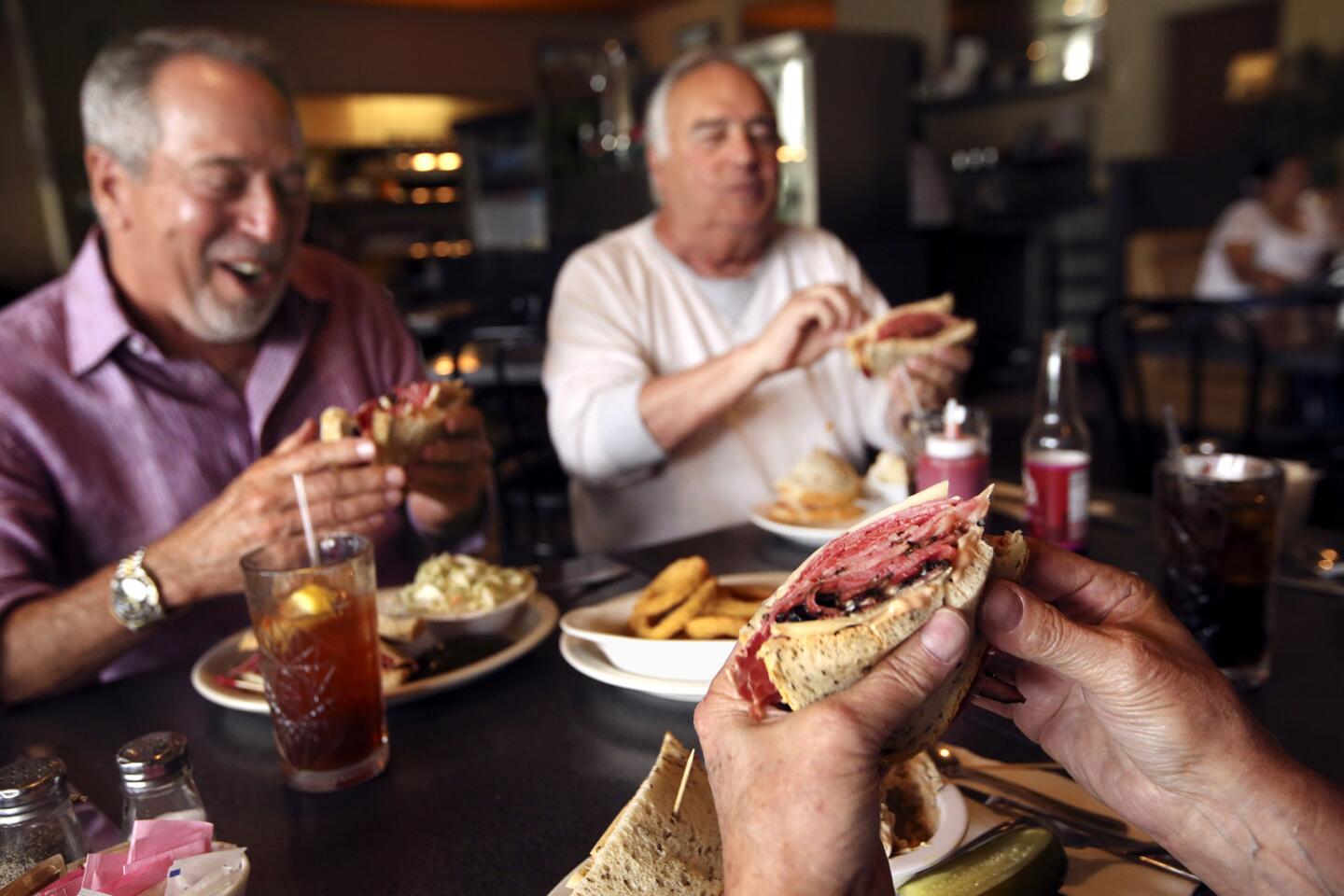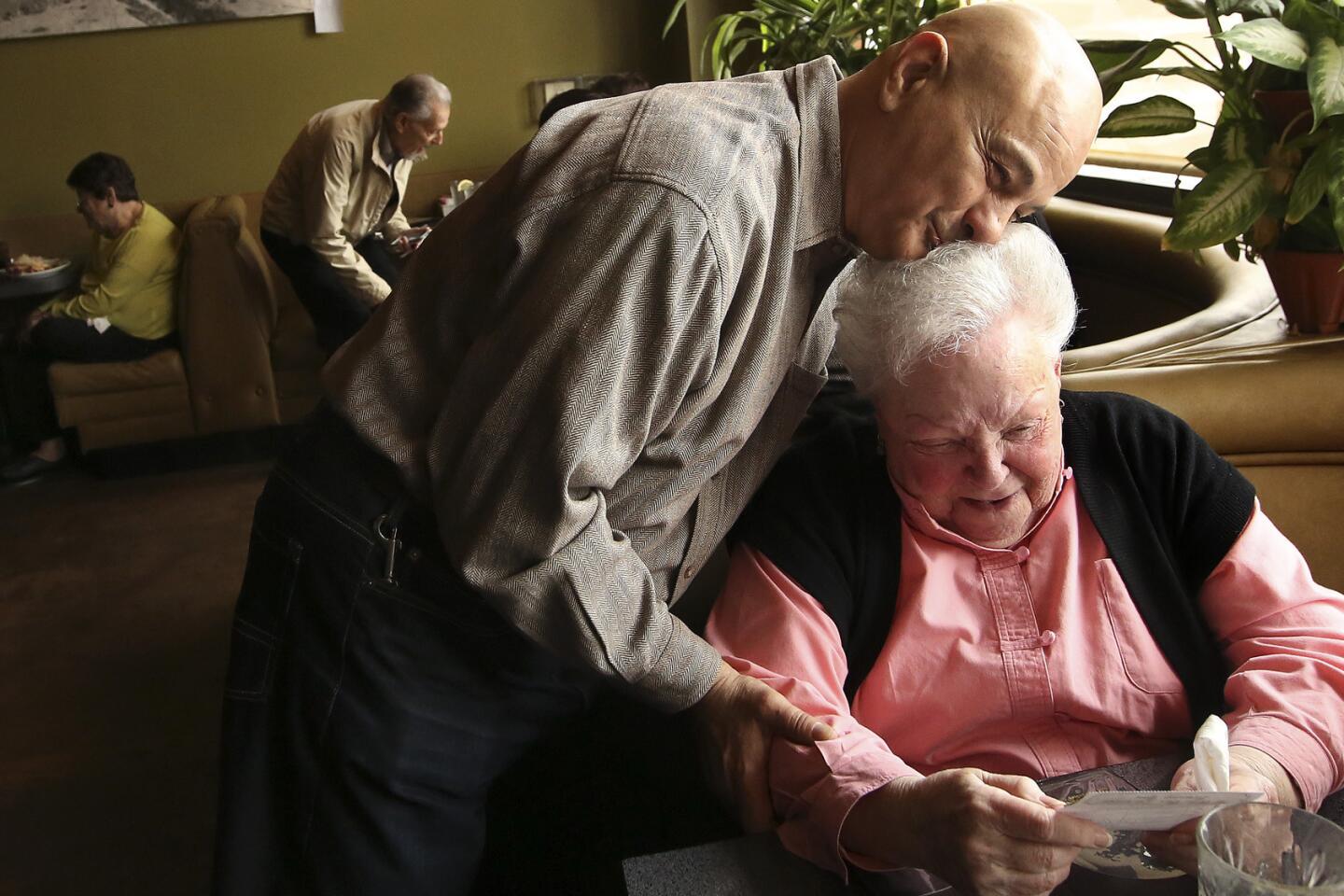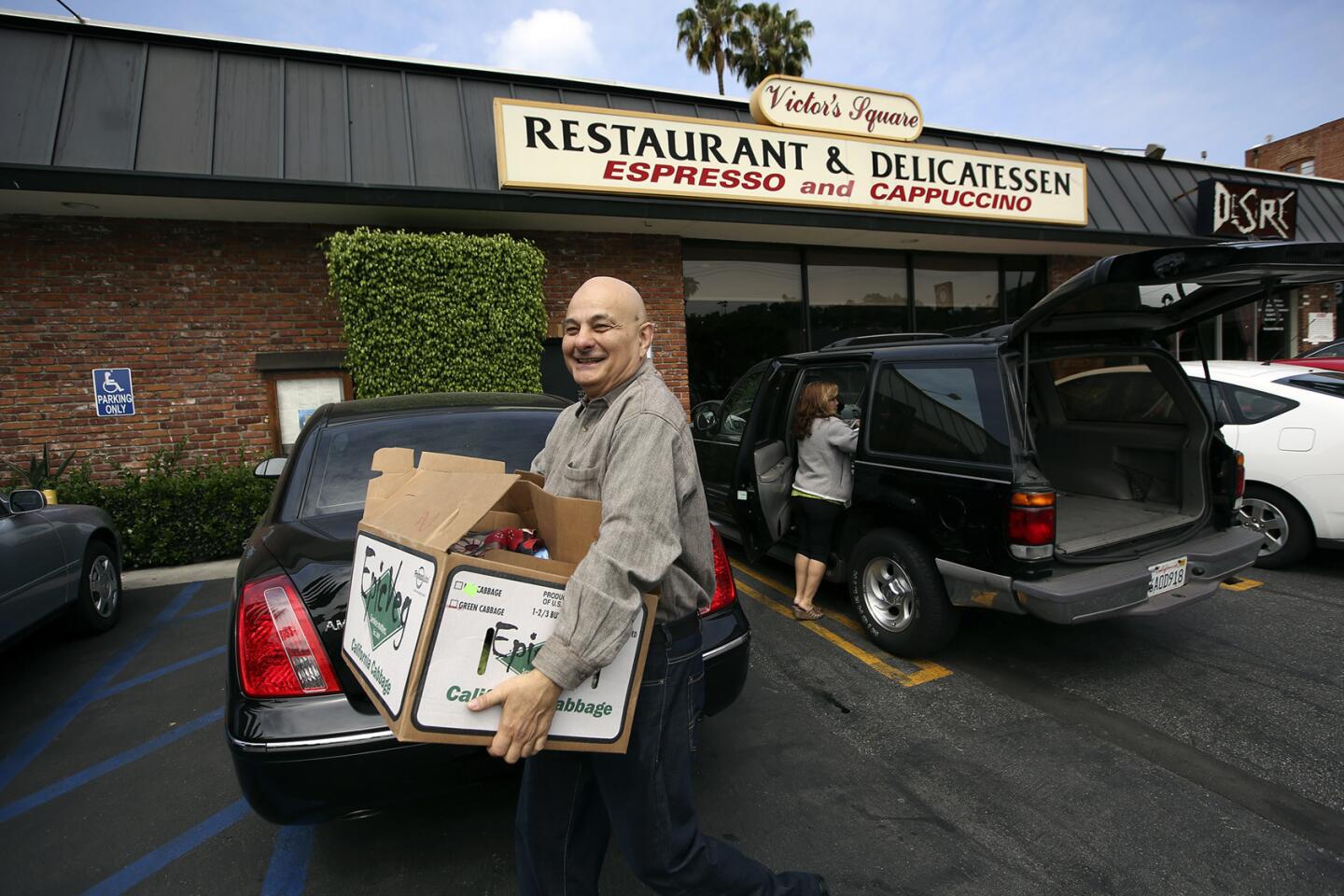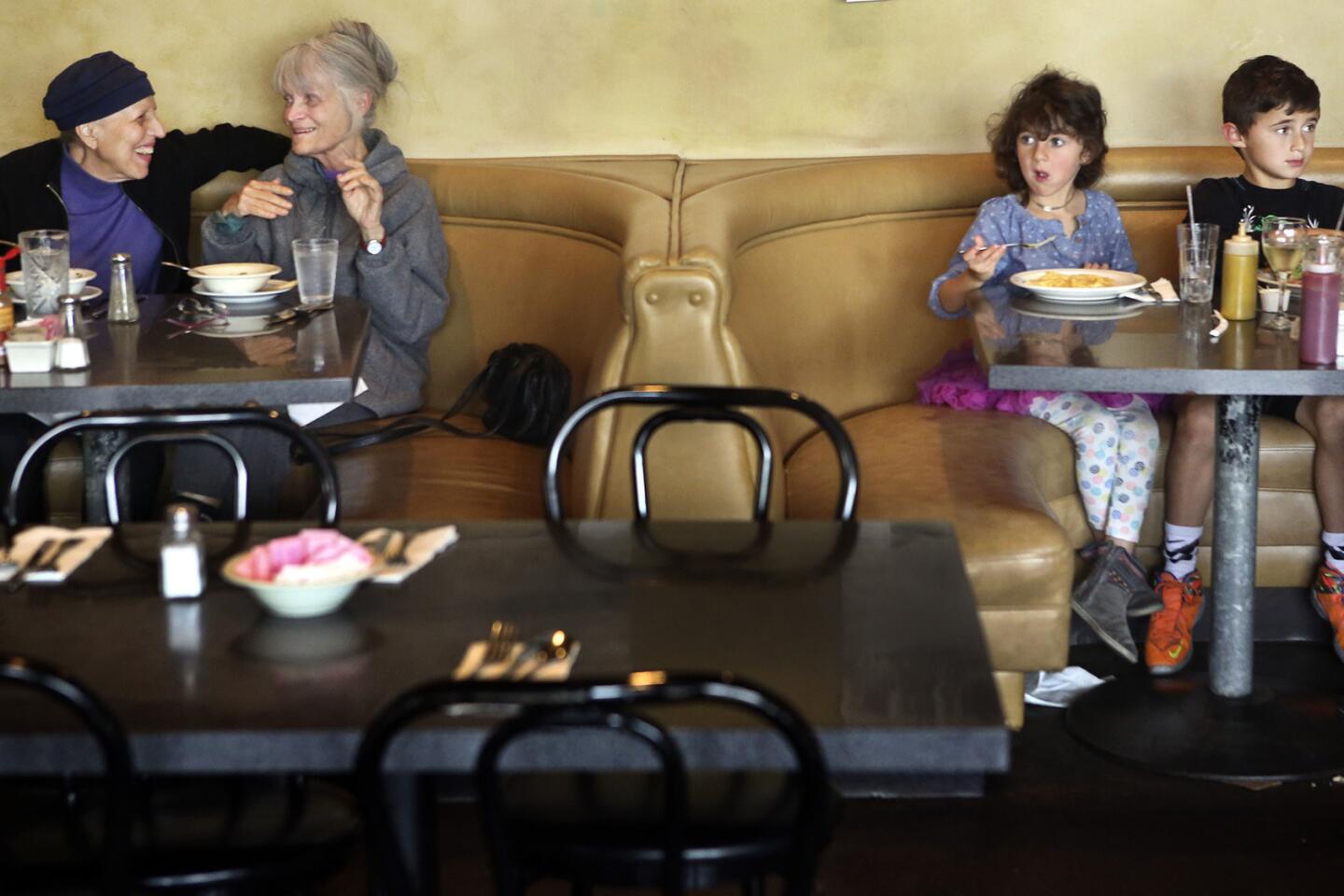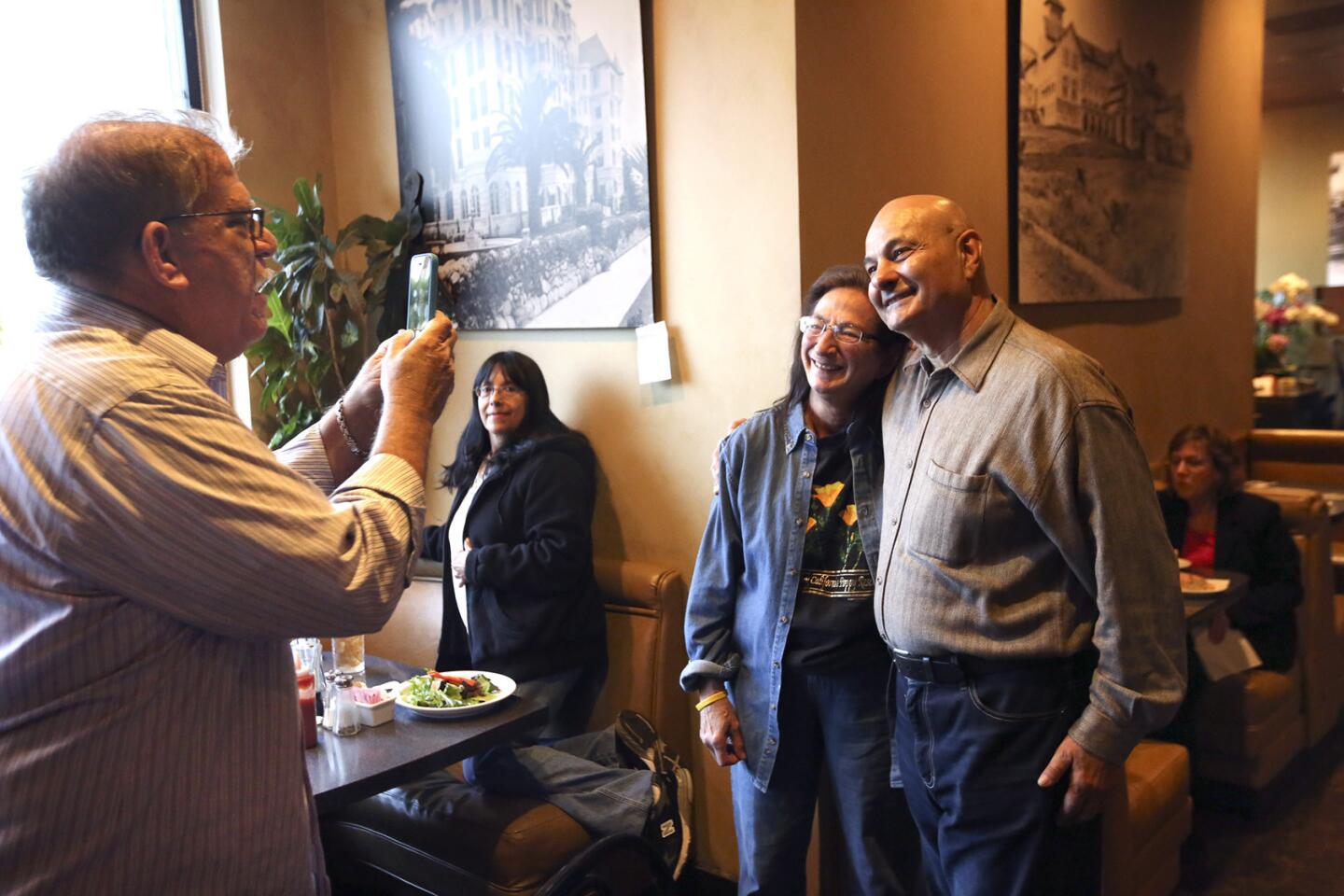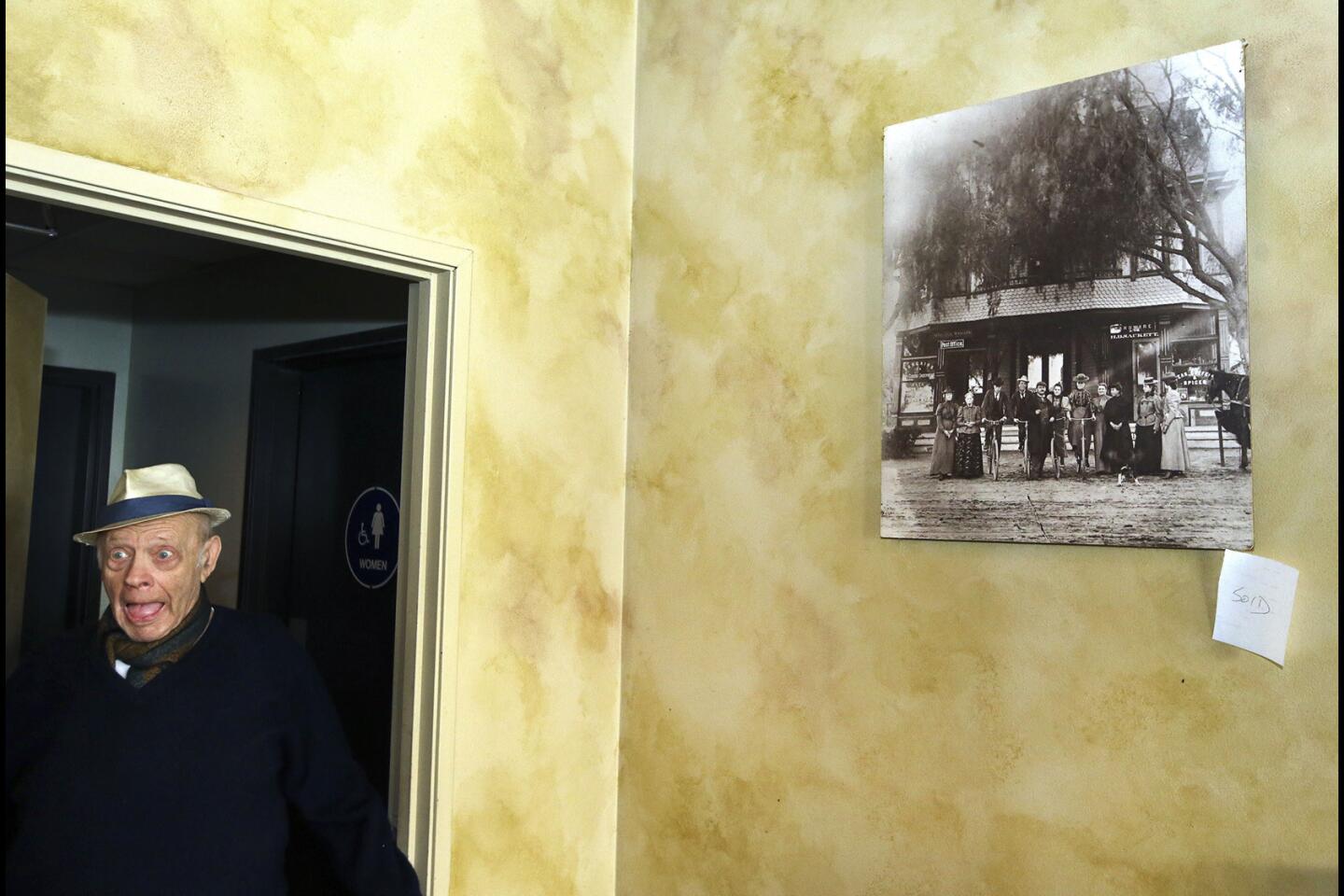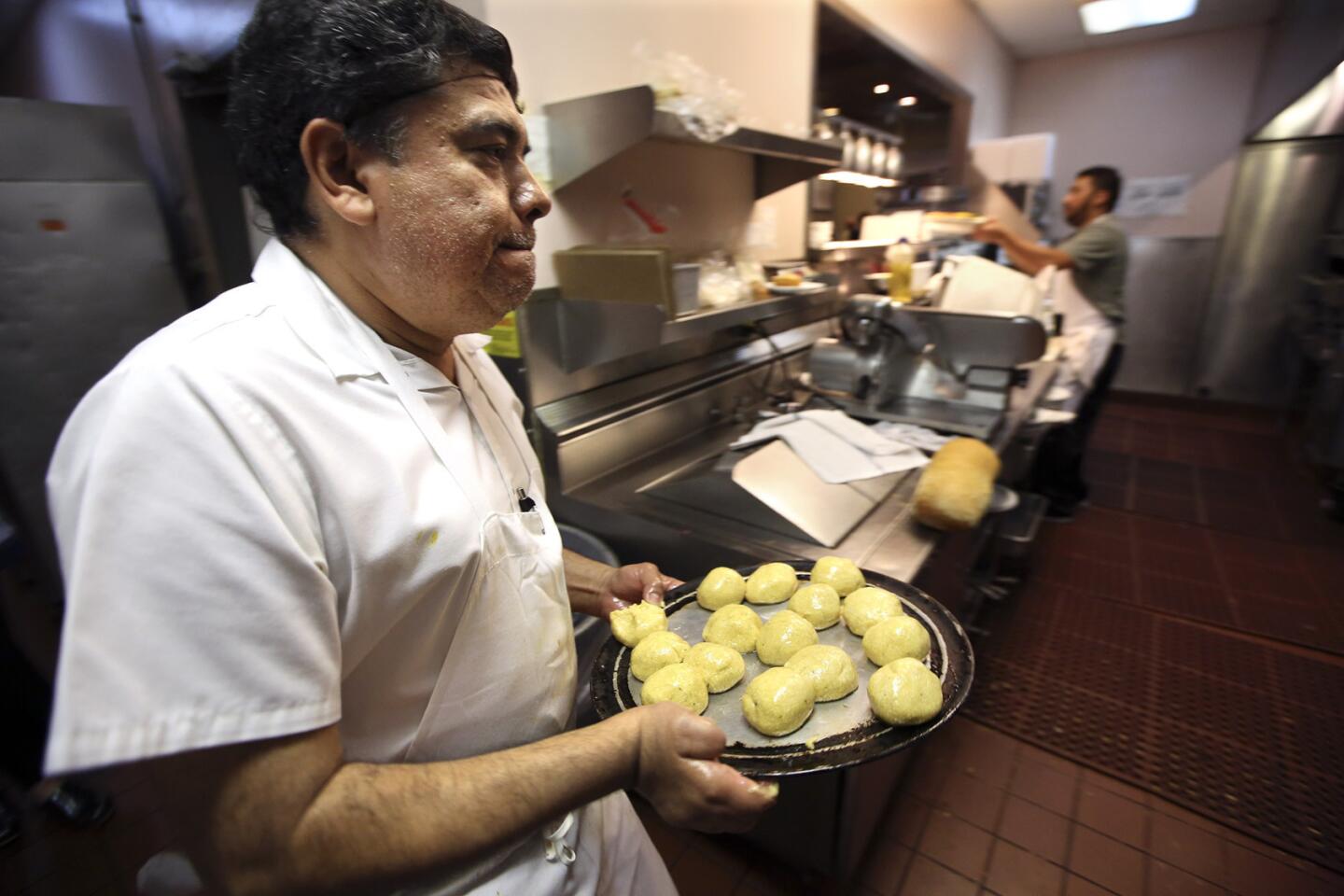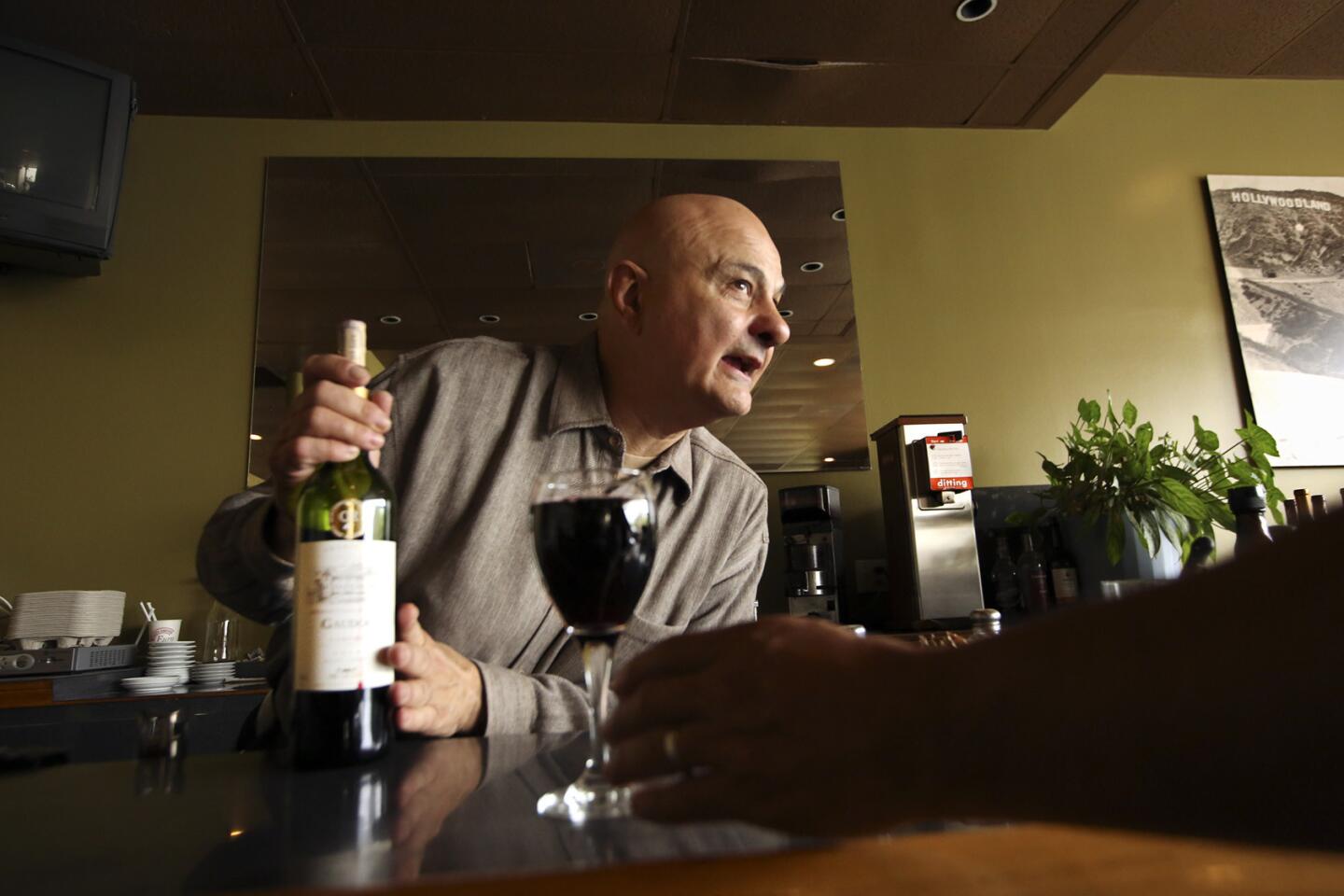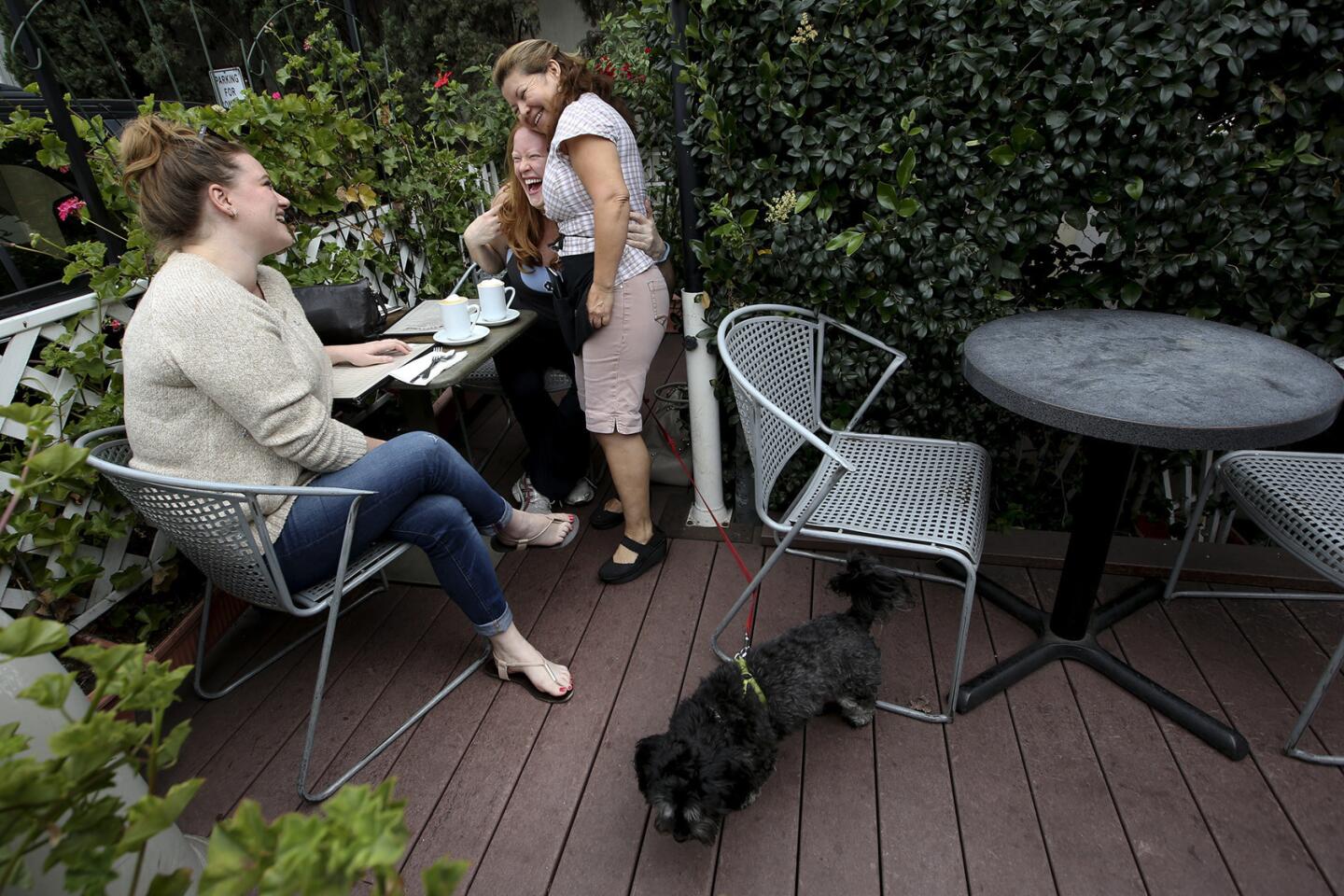Great Read: Hollywood bids a tearful farewell to Victor’s Square Restaurant
- Share via
Supplies were running low on a weekday night at Victor’s Square Restaurant in Hollywood. They were out of roast chicken and baked potatoes, and it was getting hard to keep up with all the orders for matzo ball soup.
When a guy sitting at the counter said he had a yen for sauteed chicken livers, no amount of begging could change the fact that the last ones had been served.
At 8 p.m., with all nine booths and most of the tables filled, owner Bill Gotti did something he hadn’t in 25 years: He locked the glass front doors a full hour before closing time. He had all the diners he could feed.
On so many other nights, it would have felt like the answer to his prayers. But not on this night. On this night, it hurt.
Victor’s was four days from closing. People were pouring in to say goodbye.
They had tears in their eyes. Their voices trembled. They said, “Please don’t go” and “What can we do to make you stay?” and “How about if we start a petition or pledge to come three times a week?”
Gotti kept choking up too. But he knew there was no going back.
He’d created such a comfy restaurant. For years, it served as a community clubhouse, where people could walk in and count on catching up with neighbors and friends.
But so many newcomers with new tastes had moved into the neighborhood. Rents had skyrocketed, and he’d been told he couldn’t extend his 30-year lease. If business had been great, maybe he could have managed, but most of his old-timers who had cut back during the recession never fully returned.
“Before the economy collapsed, some people used to come here three times a day. Then they started coming maybe once a day, every other day, a couple times a week, less,” said Gus Guijarro, a Victor’s waiter for 21 years.
Now as Gotti moved around the packed room, people held out their cellphones to take photos. They caught his eye and made sad faces. Some of the saddest, he said, he’d barely seen in years.
The day before at lunch, Gene LePere said she was “heartbroken, just heartbroken” to be losing her favorite deli.
“I love this place. I love Bill. For someone who’s not Jewish … he knows more Yiddish than I do,” the 88-year-old former New Yorker said. “But I could see what was happening. He had an older crowd.”
As she paid at the cash register, the sweet-looking woman with snow white, cotton-candy hair surveyed the unusually large lunch crowd and said, none too quietly: “I feel like getting up on a table and screaming at them, ‘Where the … were you when we needed you?’”
LePere’s words made Gotti laugh. But he spoke no words of blame.
Lives change, he said. So do people. Some move away. Some just move on.
“I’ve had a good run,” he kept telling customers as he rubbed away tears with the heels of his hands.
::
That Gotti, 67, had any kind of a run as a purveyor of blintzes and bagels might seem surprising — even more so that he developed the recipe for the neighborhood’s go-to matzo ball soup, with its golden broth, its big chunks of carrot, celery and chicken, its bagel chips hanging off the spoon.
He’s Italian American, born in the Bronx, raised in Brooklyn. He’s also the younger brother of the late Mafia boss John Gotti, a fact he’s neither shied away from nor flaunted.
“There’s no family code that you behave like so-and-so,” he said. “Each of us chose our own paths and I chose … what I thought was more culturally inviting for me.”
This Gotti chose delis.
He worked at his first when he was 12 or 13. He juggled shifts while going to college and tracking trades on the floor of the New York Stock Exchange. By 1972, he had young children and wanted out of the city.
“In a number of ways, it was kind of hectic,” he said. “I always wanted to raise my kids in a calm atmosphere.”
So he moved to L.A., where soon he was managing Greenblatt’s. He also started studying wine — because he’d noticed how much customers were spending on it. In time, he began offering his own classes and tastings, which helped him land a job 32 years ago on the corner of Franklin and Bronson avenues.
Gotti partnered with the grandson of Victor Levy, who had started a grocery store on the site in 1929. At what was now Victor’s Liquor, he added to the offerings: fine wine, deli food and freshly roasted coffee beans. Then in 1990, they opened the restaurant next door.
It had cushy tan booths, lazy ceiling fans, big black-and-white photos of old Hollywood on the walls. The menu went on forever — part diner, part home-style Italian, part old-school Jewish deli. Pancakes, pasta, franks and beans, egg creams, something for everyone.
Former East Coasters living in the nearby canyons and hills felt instantly at home. Writers, directors, show-runners and movie stars worked and ate there undisturbed. Staffers at the American Film Institute called it their commissary. A group of comedy writers began showing up every Sunday for brunch. Young parents nested there, infants and toddlers in tow.
When the liquor store closed in 2008, the space was leased by a new gourmet market with a central communal table. Each night of the week had a theme: tacos, specialty grilled cheeses, “artisanal burgers.”
Over the years, Gotti tried in his own way to keep up.
He put a note on its front page: “Vegan & Vegetarian Dishes Available.” He got an espresso machine. He painted the white walls green.
Finally he realized that to survive, he would have to be bold. He planned to spiff up the space and make one side elegant, with fine dining and tablecloths. He’d even rename the restaurant Gotti’s, if that’s what it took to lure new customers. “I wasn’t going to put guns on the walls or anything,” he said, laughing, “but there would have been family photos.”
A few months ago, though, when he asked to extend his lease to be sure he would have enough time to recoup the costs, he says he was turned down flat.
In the same shopping strip a few doors away, a shoe box of a pizza shop was paying more than he was for less than a third of his space. He saw no way out but to close, he said.
First, he told his staff and helped them find new jobs. Then he bequeathed his chicken soup recipe to Modern Eats, a Silver Lake restaurant where some of them would be working.
Only then did he tape a note to Victor’s front door: “To all our loyal patrons — now friends and family.”
It wasn’t lost on Gotti how long it took people to stop by and notice.
Some who were accustomed to getting food delivered found out on the phone. The writer James Ellroy was one of them.
“I hear silence, James,” Gotti said in the long pause after he broke the news.
::
In the final days, longtime customers came in for meal after meal. At the cash register up front, Gotti hugged and kissed and tried to reassure — stressing the chicken soup’s survival.
But they wouldn’t be soothed because what they were losing wasn’t on any menu.
It was the way, when they walked in, Gotti said “make yourself comfortable” and meant it, the way he knew all their names and often added “sweetheart” or “my love,” the way he always kept a stash of Tootsie Pops for the children.
The way he and his loyal crew — especially wife Lucy, son Nick and Guijarro — felt like extended family. The way, at Victor’s, they once had been young.
“We raised our kids in here,” Arthur Sellers said as he sat at a window booth with Jacob Epstein, a fellow television writer. The two old friends met when their children, now 23, were in preschool.
“It was just a wonderful place on weekends, kids flying off baby chairs and running around,” Epstein said. “In a city that can be very anonymous and alienating and crazy, it was close to a kind of community Saturday and Sunday ritual.”
Actor Curtis Armstrong said he always chose Victor’s for business meetings. It was over a meal there that he told friends he was about to propose to his girlfriend, now his wife. When their daughter, Lily, was born, Victor’s was her first restaurant. “Bill would wait until the plates were set down on the table,” Armstrong said. “Then he would pick Lily up and carry her around so we could eat.”
Lily is 19 now and in college. But Armstrong’s memories of life’s big moments, he said, forever will be intertwined with the sights, sounds and smells of the restaurant.
So too for many others who braved the final-day crowds — the elderly men in hats, jackets and ties, the retired women sipping white wine at noon, the last batch of former Victor’s babies in search of the last Tootsie Pops.
Some asked for souvenir menus. Some asked to buy the photos on the walls. Some fretted about what sort of trendy place would move in next or tried to eat everything they’d never tasted on the menu.
The most heartbroken ordered dish after to dish to freeze, as if by doing so they could later bring Victor’s back.
Follow City Beat @latimescitybeat on Twitter and at Los Angeles Times City Beat on Facebook.
More to Read
Sign up for Essential California
The most important California stories and recommendations in your inbox every morning.
You may occasionally receive promotional content from the Los Angeles Times.
